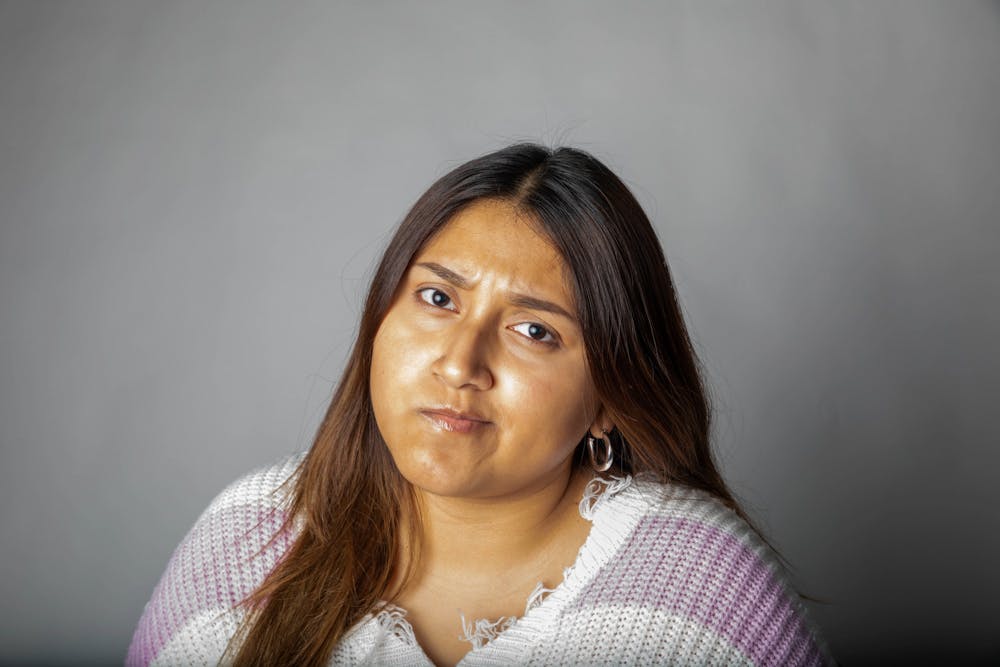
Delmy Hernandez is a senior journalism and telecommunications major and writes “Keeping it Real” for The Daily News. Her views do not necessarily reflect those of the newspaper.
As reported by the Johns Hopkins Coronavirus Resource Center, more than 2.65 million people have died from the virus, and I am thankful to not be part of that statistic. Instead, I am one of the 120 million individuals who had COVID and, fortunately, one of the 67.9 million who recovered.
One Monday in February, I began to experience cold-like symptoms. Two days later, I tested positive for COVID-19.
I remembered I wouldn’t be able to celebrate my birthday that weekend with friends — or even my boyfriend — and, seconds later, the tears came. I cried as I realized I was going to have to isolate in my small room for the next week. I had already been staying away from most friends due to the pandemic — then, I had to stay away from all of them.
I was entirely alone through one of the most challenging times I’ve experienced.
According to the Centers for Disease Control and Prevention (CDC), people experience their own set of symptoms when diagnosed with the virus. I, unfortunately, experienced all symptoms listed by the CDC minus nausea and vomiting. I had a sore throat, headache and cough like no other. My voice was gone for almost a week, my sense of smell for a week and taste for three weeks.
My muscles and body ached simply laying in bed. I ran out of breath taking showers, and my fatigue took over my ability to continue to do coursework. My assignments were put on hold, my symptoms continued to develop, and, although I’ve recovered, my mental health deteriorated in the process.
It’s no secret COVID-19 has impacted the mental health of many in isolation or quarantine. The National Alliance on Mental Illness (NAMI) website has a tab solely dedicated to COVID-19 Information and Resources, including a guide with frequently asked questions from managing anxiety and quarantine to where a person can access health care and medications. NAMI also provides readers with resources on where to receive financial assistance, which happened to be one of my biggest stressors while I was sick and even now that I have recovered.
My last day of work before my leave was Feb. 18, and I returned more than a month later. Although I had two paychecks come in during my isolation, both were small and used to buy medicine, disinfectants and plenty of food deliveries. Because I lost my senses of smell and taste, my usual chicken soup, chicken nuggets and omelets were no longer enough. I began to lose my appetite as I could no longer taste my food, leading me to resort to getting spicier and saltier foods delivered to my front door.
Now, my taste is back, and I am out of quarantine but with little money to keep me going. My hours have been cut short, and I have been given fewer shifts.
To add to my stress, I am struggling to catch up in school, which has made it difficult to find time to apply for summer internships in order to fulfill my last requirement to graduate.
However, nothing will compare to the stigma I faced as a result of having COVID-19.
Last April, the Mayo Clinic published an article regarding the stigma the virus has and ways to reduce it. According to the article, “Stigma can make people feel isolated and even abandoned. They may feel depressed, hurt and angry when friends and others in their community avoid them for fear of getting COVID-19.”
Fortunately, my coworkers felt comfortable seeing me outside of work a week after I got out of quarantine because of the extreme measures I took to disinfect everything, including the papers in my planner. Since the day I received my test result, I had been coming up with ways to make sure my home was free from COVID-19 after I was no longer contagious. I wanted to keep others safe, and, later, I realized I wanted to keep myself safe from the judgment. My small group of coworkers greeted me with love and open arms. In that moment, I felt like I wasn’t surrounded by a stigma or financial and academic worries. I felt accepted.
My loved ones, on the other hand, were afraid to hug me at first and backed away upon finding out I once had the virus.
I wanted to then, and still do, take precautions to ensure I was playing my part in stopping the spread of the virus, but there were times I felt like a rat no one wanted to be around. My mental health spiraled as I was in isolation, and, now, I continue to struggle with my mental health because of the stigma surrounding COVID-19. My loved ones’ reactions were heartbreaking, and, although they are warming up to me now, the pain is still there. I felt neglected, as if I was still a threat to the lives of others. I didn’t feel accepted by the people I needed love from the most.
I thought to myself, “What if my loved ones never hug me again?”
I am thankful to be alive and recovered from COVID-19, but it will take a long time for my mental health to recover from the damage the virus did. For now, I’m focused on safely hanging out with friends and having small moments to relax my mind through coloring and watching “Catfish.” That’s enough for me.
I stayed strong while I was sick, and I’ll continue to do so as I work on strengthening my mental health one coloring page at a time.
Contact Delmy Hernandez with comments at djhernandez@bsu.edu or on Twitter @delmyy_h.





